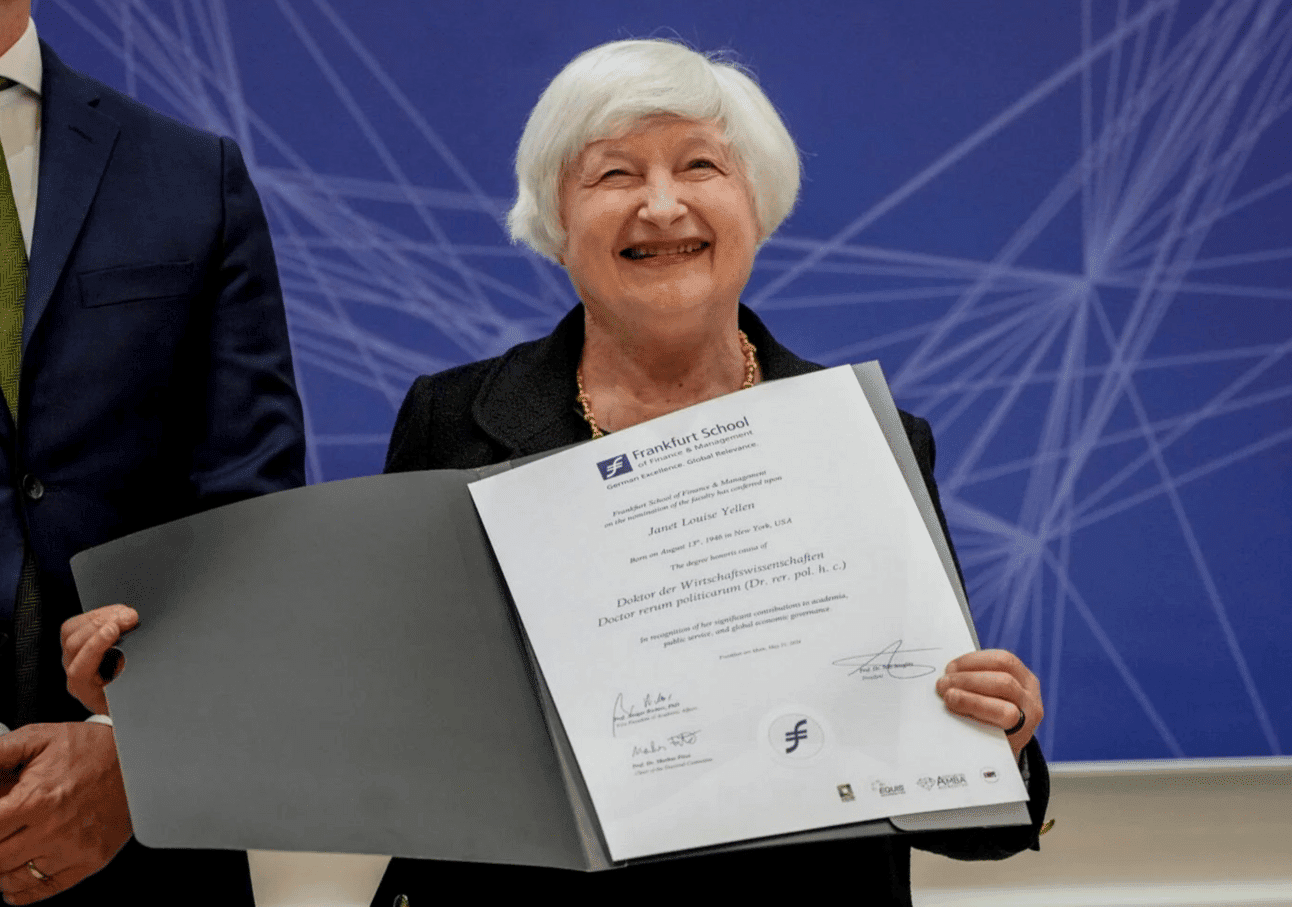While picking up an honorary degree, US Treasury Secretary Janet Yellen also dropped a speech in Germany yesterday (Tuesday) ahead of this week’s G7 finance ministers meeting.
Addressing students (and Germany’s finance minister) at the Frankfurt School of Finance and Management, Yellen took to the podium with a few pleas.
So, let’s dive in and highlight the three quotes you need to know.
Stay on top of your world from inside your inbox.
Subscribe for free today and receive way much more insights.
Trusted by 99,000+ subscribers
No spam. No noise. Unsubscribe any time.
- “The Inflation Reduction Act is not a turn toward American protectionism”
The US passed the Inflation Reduction Act (IRA) in 2022 to drive its energy transition, curb its dependence on China, and revive US manufacturing. But for the EU, the IRA’s subsidies and ‘Made in America’ rules were unfair and unlawful.
So if Yellen claims the IRA isn’t just a US turn inwards, then… what is it? Her speech gives four interesting (if elliptical) answers:
First, “we’re not creating opportunities just at home.” The IRA offers little for the EU (because there’s no EU-US free trade pact), so Yellen instead highlights US purchasing and investment power, plus the value of cheaper green energy for all.
Second, Yellen argues that while fossil fuels are a “tragedy of the commons”, the energy transition now presents opportunities for all ($3T in investment per year).
Third, Yellen says “we welcome similar action around the world”, which is a polite way of saying “you now do it too” (she highlights the European Green Deal).
And fourth, Yellen basically says that things could be worse, painting a picture of what she says Biden inherited when he took office, and what could return after November’s election: “a rejection of multilateralism”.
- “It’s vital and urgent that we collectively find a way forward to unlock the value of Russian sovereign assets immobilized in our jurisdictions for the benefit of Ukraine”
When it comes to Russia, the US and EU often agree in principle but then diverge on details. Eg, EU leaders agreed “in principle” in March – as did US lawmakers in April – to repurpose seized Russian assets for Ukraine.
But US lawmakers are now pushing Biden on the ‘how’, and Yellen here makes public her own private push to figure it out together. So there are hopes for some kind of joint announcement at the G7 leaders summit in Italy this June.
Yellen also urges unity in “cracking down on Russian sanctions evasion”, as evidence keeps emerging that US and EU tech is turning up in Russian arms.
- “China’s industrial policy may seem remote… but if we do not respond strategically and in a united way, the viability of businesses in both our countries and around the world could be at risk.”
Finally, Yellen is hinting here at what we all see: the West looks divided on China. Those economies more reliant on selling stuff to China, like the EU and particularly Germany, hope to tread carefully to maintain their access to China’s market.
But repeating her past points about China’s “industrial overcapacity”, Yellen is basically arguing here that if Europe doesn’t wise up (ie, like the US), China’s renewed push to export more low-cost goods could wipe out more industries.
INTRIGUE’S TAKE
The timing of Yellen’s speech was interesting, though when is it not?
- First, Yellen’s speech came just hours after European President von der Leyen hinted that the EU will soon slap tariffs on China’s EVs.
- Second, Yellen’s speech came just days after Biden announced new US tariffs – which Yellen defended as “strategic and targeted” – on China’s EVs and other goods.
- Third, her speech came just weeks after President Xi visited France for some frank discussions on Ukraine and trade.
- And fourth, it came just a month after Xi hosted German Chancellor Scholz in China for a dialogue that was a little more sympathetic.
So… developments between the West and China are coming thick and fast right now, but (or maybe therefore?) the West’s messaging is a mess.
And that’s what’s driving the ‘unity’ theme in Yellen’s speech: “joint” appears 12 times; “collective” eight times; “together” another four. And so on. But Europeans are weighing that US message of unity against what else they see: the US is still making its own moves, and it faces an election in November.
And that’s what’s driving the EU’s thinking around a possible ‘third way’, independent of China and the US.
But as the US blocks more of China’s cheap goods, there’s only one other market big enough to absorb them: the EU. And that rerouting of even more goods from China to the EU, rather than any US speech in Frankfurt, might be what eventually forces the EU’s hand.
Also worth noting:
- The leaders of Germany and Sweden have voiced scepticism towards the latest US tariffs on China. Sweden’s prime minister said during a joint press conference last week that imposing tariffs is generally “not a good idea for major exporters like Germany and Sweden”.








